The Importance of Regular Software Updates for Computer Maintenance
Computer Maintenance: The Importance of Regular Software Updates
In today’s digital age, computers have become an integral part of our lives. From personal use to professional tasks, we rely on these machines for a multitude of purposes. However, like any other device, computers require regular maintenance to ensure optimal performance and longevity. One crucial aspect of computer maintenance is keeping the software up to date. In this article, we will explore the importance of regular software updates and how they contribute to the overall health of your computer.
Software updates, also known as patches or upgrades, are released by software developers to fix bugs, enhance security, and introduce new features. These updates are designed to address vulnerabilities that may have been discovered since the software’s initial release. By installing these updates, you can protect your computer from potential threats and ensure that it continues to function smoothly.
One of the primary reasons why regular software updates are essential is security. Cybercriminals are constantly evolving their tactics to exploit vulnerabilities in software. By not updating your computer’s software, you are leaving it susceptible to these attacks. Hackers can exploit security loopholes in outdated software to gain unauthorized access to your computer, steal sensitive information, or even take control of your system. Regular software updates help to close these loopholes and keep your computer secure.
Apart from security, software updates also play a crucial role in improving the performance of your computer. Developers often release updates to fix bugs and optimize the software’s functionality. These updates can enhance the speed, stability, and overall efficiency of your computer. By keeping your software up to date, you can ensure that your computer runs smoothly and performs at its best.
Moreover, software updates often introduce new features and functionalities that can enhance your computing experience. These updates can bring improvements to existing features, introduce new tools, or enhance compatibility with other software and devices. By staying up to date with the latest software updates, you can take advantage of these new features and enjoy a more seamless and productive computing experience.
It is worth noting that software updates are not limited to the operating system alone. Applications and programs installed on your computer also require regular updates. These updates are essential for the same reasons as operating system updates – security, performance, and new features. Neglecting to update your applications can leave them vulnerable to security breaches and may result in compatibility issues with other software or hardware components.
To ensure that your computer remains up to date with the latest software updates, it is recommended to enable automatic updates whenever possible. Most operating systems and applications offer this option, allowing updates to be installed automatically without requiring manual intervention. This ensures that your computer is always protected and running on the latest software versions.
In conclusion, regular software updates are crucial for computer maintenance. They provide essential security patches, improve performance, and introduce new features. By keeping your software up to date, you can protect your computer from potential threats, enhance its performance, and enjoy a more seamless computing experience. So, make it a habit to regularly check for and install software updates to keep your computer in optimal condition.
Effective Strategies for Cleaning and Organizing Your Computer Files

Effective Strategies for Cleaning and Organizing Your Computer Files
In today’s digital age, computers have become an integral part of our lives. We use them for work, communication, entertainment, and so much more. With all the data we accumulate on our computers, it’s essential to keep our files organized and our systems running smoothly. In this article, we will discuss some effective strategies for cleaning and organizing your computer files.
First and foremost, it’s crucial to regularly clean up your computer’s hard drive. Over time, files and programs can accumulate, taking up valuable space and slowing down your system. Start by going through your files and deleting any unnecessary documents, images, or videos. Be ruthless in your decluttering process, as it will free up space and make it easier to find the files you actually need.
Next, consider using a file organization system that works for you. One popular method is to create folders and subfolders to categorize your files. For example, you could have a main folder for work-related documents, with subfolders for different projects or clients. This way, you can easily locate specific files without having to search through a cluttered desktop or a long list of documents.
Another useful strategy is to utilize file naming conventions. When saving a file, give it a descriptive and meaningful name that reflects its content. This will make it easier to find later on, especially if you have a large number of files. Avoid generic names like “Document1” or “Untitled,” as they provide little information and can lead to confusion.
Furthermore, consider using tags or labels to further organize your files. Many operating systems and file management software allow you to assign tags or labels to files, making it easier to search for specific types of documents. For example, you could tag all your financial documents with the label “Finance” or all your vacation photos with the label “Travel.” This way, you can quickly filter and locate files based on their tags.
Regularly backing up your files is another essential aspect of computer maintenance. Hard drives can fail, and accidents can happen, so it’s crucial to have a backup of your important files. Consider using an external hard drive, cloud storage, or a combination of both to ensure your files are safe and easily recoverable in case of any unforeseen events.
In addition to organizing your files, it’s also important to keep your computer’s software up to date. Regularly check for updates for your operating system, antivirus software, and other essential programs. These updates often include bug fixes, security patches, and performance improvements, ensuring that your computer runs smoothly and securely.
Lastly, don’t forget to regularly clean your computer physically. Dust and debris can accumulate in your computer’s vents and fans, causing it to overheat and potentially damage the internal components. Use compressed air or a soft brush to gently clean these areas, being careful not to damage any delicate parts.
In conclusion, effective strategies for cleaning and organizing your computer files are essential for maintaining a well-functioning system. Regularly clean up your hard drive, utilize file organization systems, and employ file naming conventions and tags. Remember to back up your files, keep your software up to date, and physically clean your computer. By following these strategies, you can ensure that your computer remains organized, efficient, and reliable for years to come.
Tips for Preventing Overheating and Ensuring Proper Ventilation in Your Computer
Computer Maintenance: Tips for Preventing Overheating and Ensuring Proper Ventilation in Your Computer
Computers have become an integral part of our lives, serving as our primary tool for work, communication, and entertainment. With their increasing power and capabilities, it is essential to ensure that they are properly maintained to prevent overheating and ensure proper ventilation. Overheating can lead to a range of issues, from decreased performance to permanent damage to your computer’s components. In this article, we will discuss some tips to help you prevent overheating and ensure proper ventilation in your computer.
First and foremost, it is crucial to keep your computer clean. Dust and debris can accumulate inside your computer, blocking airflow and causing it to overheat. Regularly cleaning your computer’s internal components, such as the fans and heat sinks, can go a long way in preventing overheating. You can use compressed air or a soft brush to remove the dust from these areas. Additionally, make sure to clean the external vents and ports to ensure proper airflow.
Another important tip is to ensure that your computer is placed in a well-ventilated area. Avoid placing your computer in enclosed spaces or near heat sources such as radiators or direct sunlight. These factors can contribute to increased temperatures and hinder proper ventilation. Instead, opt for a cool and well-ventilated room where air can circulate freely around your computer.
Furthermore, consider investing in additional cooling solutions for your computer. While most computers come with built-in fans and heat sinks, these may not always be sufficient, especially if you engage in resource-intensive tasks such as gaming or video editing. You can purchase additional fans or cooling pads to help dissipate heat more effectively. These cooling solutions can be placed strategically to target specific areas prone to overheating, such as the CPU or graphics card.
In addition to physical cooling solutions, you can also optimize your computer’s software settings to prevent overheating. One effective method is to monitor your computer’s temperature using specialized software. This allows you to keep an eye on the temperature levels and take necessary action if it starts to rise. You can also adjust your computer’s power settings to reduce the strain on its components, thereby minimizing heat generation. For example, you can lower the maximum processor state or enable power-saving modes when performing less demanding tasks.
Lastly, it is essential to ensure that your computer’s hardware is up to date. Outdated or faulty components can contribute to overheating issues. Regularly check for driver updates and firmware upgrades for your computer’s components, such as the graphics card or motherboard. These updates often include performance improvements and bug fixes that can help optimize your computer’s temperature management.
In conclusion, preventing overheating and ensuring proper ventilation in your computer is crucial for its optimal performance and longevity. By keeping your computer clean, placing it in a well-ventilated area, investing in additional cooling solutions, optimizing software settings, and keeping hardware up to date, you can significantly reduce the risk of overheating. Remember, a well-maintained computer not only performs better but also lasts longer, saving you time and money in the long run. So, take the necessary steps to keep your computer cool and enjoy a seamless computing experience.

